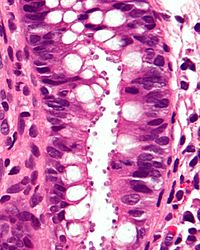
Photo from wikipedia
Cryptosporidium parvum (C. parvum) is an intracellular parasite of the intestinal cells. It causes cryptosporidiosis that can be fatal in immunosuppressed individuals. Autophagy is a process to eliminate intracellular microbes.… Click to show full abstract
Cryptosporidium parvum (C. parvum) is an intracellular parasite of the intestinal cells. It causes cryptosporidiosis that can be fatal in immunosuppressed individuals. Autophagy is a process to eliminate intracellular microbes. The autophagy-related 16 - like 1 (ATG16L1) gene encodes proteins involved in the autophagy pathway. Single nucleotide polymorphism (SNP) in this gene increases the invasion and survival of the intracellular microbes. This study aimed to assess whether SNP in the ATG16L1 gene influences the risk and severity of cryptosporidiosis. Group I: cases with C. parvum infection (C. parvum, n = 40) and group II: healthy control (HC, n = 120) were included. Genotyping of the ATG16L1 gene was done for all participants to determine the polymorphism status as AA, GG, or AG genotype. A significant association between C. parvum infection and ATG16L1 genotypes was detected. C. parvum group had a significantly higher frequency of GG genotype and G allele when compared to HC group. The genotypes (AG + GG) and G allele had 2.428 and 2.13 folds risk of C. parvum infection when compared to the AA genotype and the A allele. Patients with the AG + GG genotype had statistically significant higher Cryptosporidium oocyst counts in stool, higher infection intensity, more frequency of vomiting and dehydration, longer disease duration, and more recurrence. The GG or AG genotypes were independent risk factors in the disease severity (p- value = 0.013). In conclusion, ATG16L1 SNP increased the risk and severity of cryptosporidiosis. Thus, individuals with such SNP can benefit from autophagy up-regulating approaches in decreasing the risk and controlling C. parvum infection.
Journal Title: Molecular and biochemical parasitology
Year Published: 2021
Link to full text (if available)
Share on Social Media: Sign Up to like & get
recommendations!